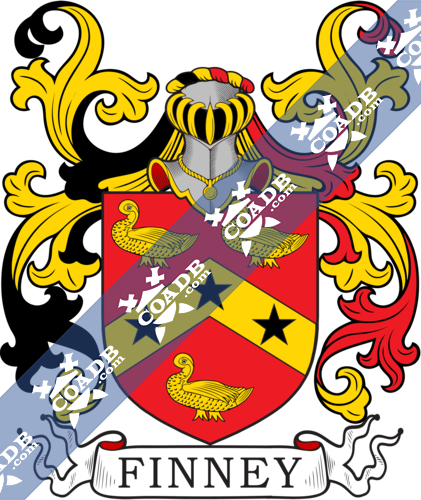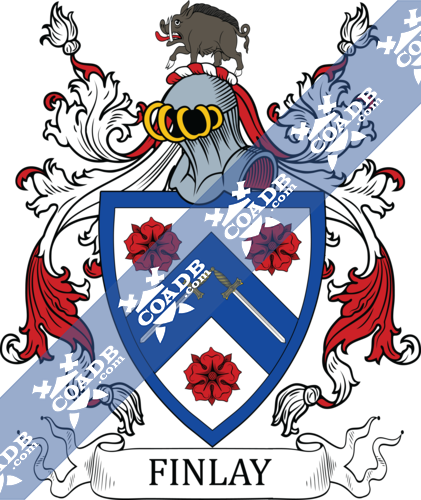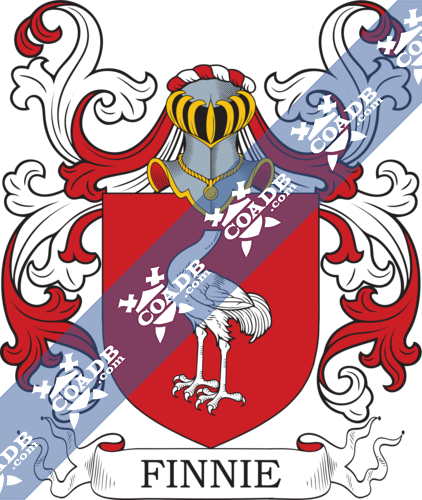Finney Family Crest, Coat of Arms and Name History

Finney Coat of Arms Gallery
Don’t know which Coat of Arms is yours?
We can do a genealogical research. Find out the exact history of your family!
Learn MoreFINNEY
The name Finney is of Gaelic/Irish origin and considered patronymic as it is derived from the medieval Irish name O’ Fiannaidh . O’ Fiannaidh is a compound of two medieval Gaelic elements. “O” as a prefix on any Irish name translates to mean “son of” the suffix in this name, Fianna, translated to “deer”.
Surnames in Britain prior to the Norman conquest were largely unheard of. In the small settlements and villages which existed during earlier times, residents found little need for surnames as everyone in these communities new each other and a given name would usually suffice. However, with the passage of time, population growth and expansions of communities as villages gave way to towns and cities, it became necessary to add a qualifier to a people’s names to distinguish them, one from another. Therefore one person may have been identified by their given name plus their occupation while another may have been identified by their given name and one of their parent’s names. The introduction of surnames by the Norman aristocracy after the invasion seemed to be the next logical step in this evolution. There was a boundless supply from which surnames could be formed, in addition to the use of patriarchal/matriarchal names or reference to the individuals occupation, there were things such as defining physical traits, a familiar geographical location or a topographical landmark found near the individuals home or birthplace, the name of the village in which the person lived, and so much more. Soon, surnames would come not just to represent an individual but whole families.
There often exists variations in spelling of many surnames, as with many given names which date back to the early centuries. The variation in spelling of both given and surnames during this time period can be attributed to a lack of continuity regarding guidelines for spelling which was compounded by the diversity of languages in use in European countries at this time. The variations in the spelling of the surname Finney include but not limited to; Finney; Feany; Fenney; Feanay; Finnay; Feaney; Finny; Fynnie; Fynney; Feenay; and Feeny, among others.
The earliest record of any variation of this surname is that of Teag O’ Feinneadha which appears in the province of Connacht Annals of 1603. These annals, not unlike the tax rolls in Britain, were a series of census and tax records kept by the English Treasury by order of King James VI, with the oldest dating back to the 12th century. They hold the distinction of being the oldest consecutive set of records detailing English governance in the United Kingdom. These records span a period of over 700 years and have proven invaluable to researches over the years. Additionally, official records show Mary Fenney was christened in Cheshire in 1654 and Thomas Phennah was christened in 1742.
The first recorded immigrant to America bearing the surname or any variation of the spelling was William Finney who arrived in 1671 and settled in Maryland. Robert Finney landed and settled in Massachusetts in 1687 and Mary Finney arrived and settled in Virginia in 1695.
There were also many immigrants to the British Common Wealth countries of Canada, Australia, and New Zealand bearing the surname Finney. Peter Finney landed in 1784 and settled in Ontario, Canada. John Finney arrived in 1851 and settled in Adelaide, Australia. Alexander and Phynia Finney and their children Annie and Mary arrived in 1874 and settled in Auckland, New Zealand.
Worldwide, the highest concentration of people with the surname Finney are found in the United Kingdom, the United States, Australia, Canada, and Ireland . By state, the largest percentile of those with the surname Finney live in Arkansas, Georgia, Idaho, Nebraska, Tennessee, and Virginia.
There are many persons of note who bear the surname Finney. The author, Jack Finney was born in Milwaukee, Wisconsin. He is a noted author of both thrillers and science fiction. Finney’s best known works are The Body Snatchers and Time and Again. Twelve of Finney’s books and short stories have been made into movies, television shows, or been the inspiration for movies.
Albert Finney was born in Lancashire, England and attended the Royal Academy of Dramatic Arts, upon graduation he joined the Royal Shakespeare Company, first appearing on the London stage in 1958. Finney has been in forty-three movies, he has been nominated for an Academy Award five times, and has won multiple acting awards including; BAFTA, Golden Globe, Emmy, and Screen
Actors Guild. For his contribution to the arts, Finney was offered an Order of the British Empire in
1980 and Knighthood in 2000. Due to his own personal convictions and beliefs, Finney declined both.
Blazons & Genealogy Notes
Notes: None. Blazon: Gules on a chevron between three martlets or, as many mullets sable.







